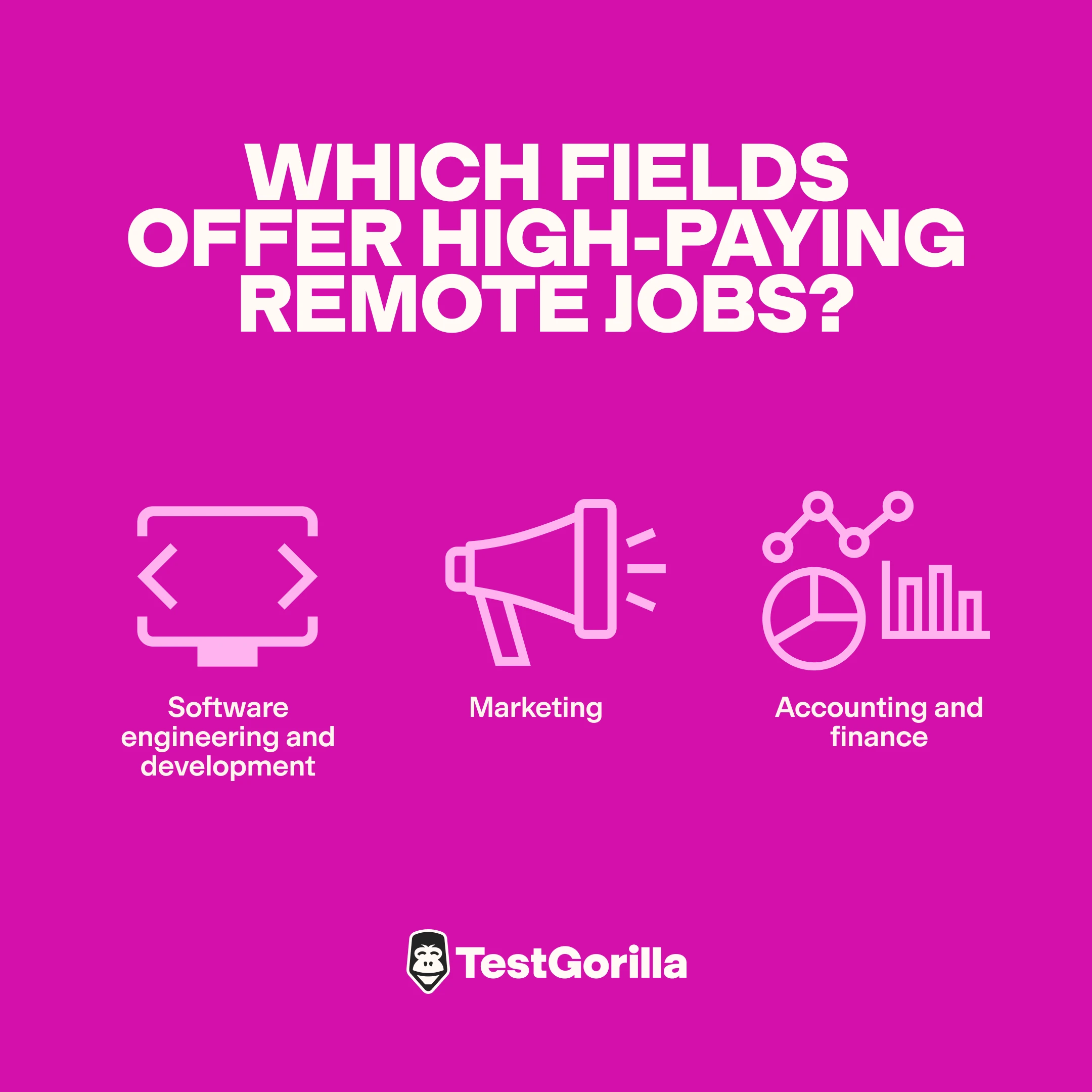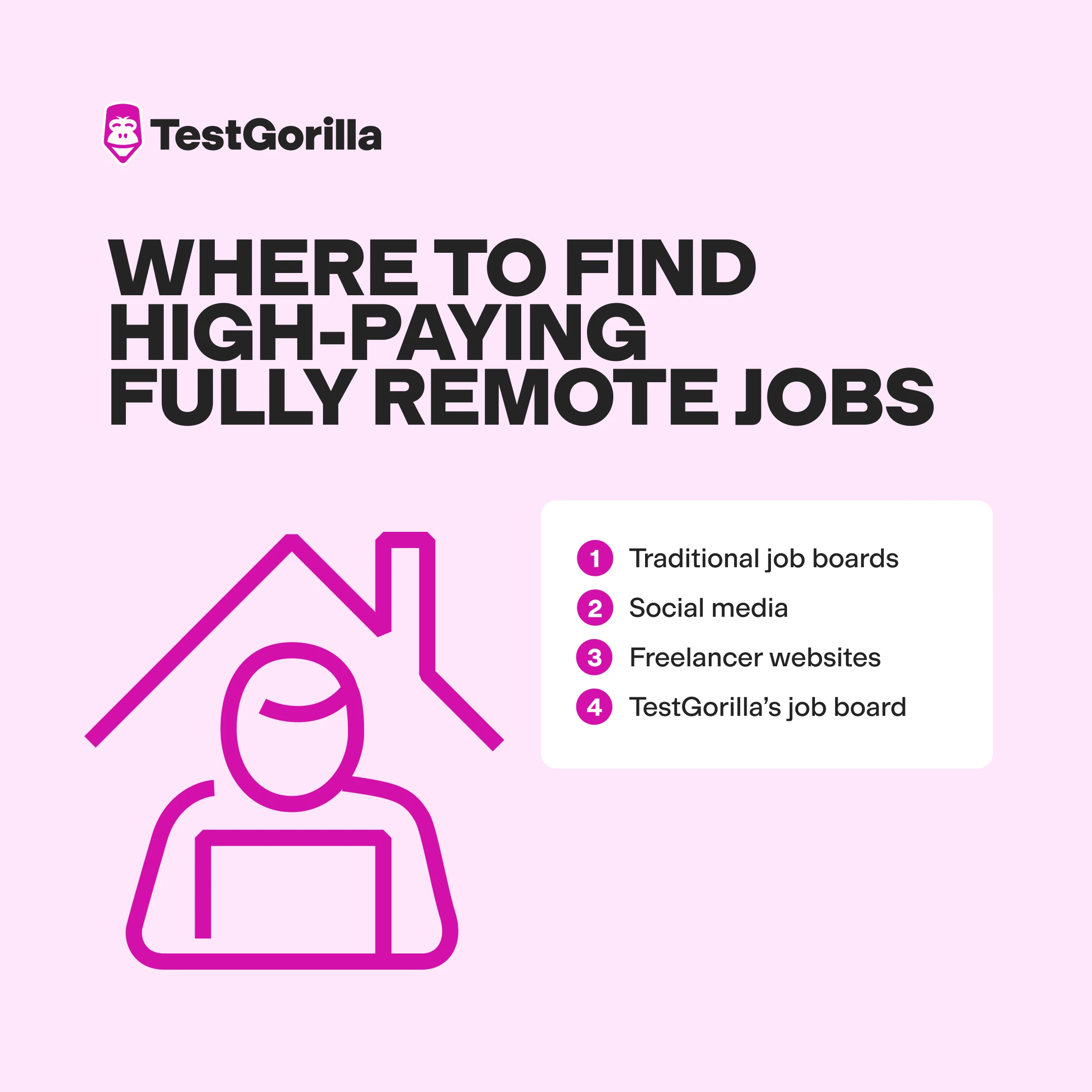The demand for remote, high-paying jobs is skyrocketing. After all, who wouldn’t want a job where you can work from the comfort of your own home and be paid well for it?
However, with more people realizing the perks of remote work, competition is fiercer than ever. Employers are swamped with applications from candidates all over the world, making it tough for applicants to stand out from the crowd. In fact, while only 10% of US roles are fully remote, they receive 46% of all job applications!
Looking to land a well-compensated remote position? Keep reading. You’ll find some types of companies that offer these roles, places where you can find them, and handy tips to help you in your search.
Table of contents
Are you a job seeker?
Visit our job seeker hub to get help with your assessment, find your dream job and more.
What does it mean to be paid well for a remote job?
High pay for a remote job may look different than high pay for an in-person job.
A recent study found that office workers are typically paid more than employees with hybrid or fully remote jobs.
So, figuring out whether a fully remote job is “high paying” isn’t as simple as looking at salary data from sites like Glassdoor. You can do this to get an idea of the pay range for a specific role – but you should consider some other factors, including:
Cost savings: You’ll save on gas, take-out lunches, and other expenses that come with office work – up to $5,000 per year. However, you might need to buy your own computer and office equipment and space (some employers will do this for you).
Quality of life: You’ll save hours of personal time by not commuting. You might have a better work-life balance. Plus, you’ll have the freedom and flexibility to work from wherever makes you happiest – whether that's a home office or your favorite coffee shop.
Comfort: Some companies do spend tons of money creating office spaces that feel more like “home” – with bean bag chairs and other cozy furnishings. But this doesn’t compare to actually being at home.
Payment structure: You might find project-based remote work that offers higher hourly rates instead of a traditional salary. While this gives you more flexibility and higher earning potential, project-based work usually doesn’t come with long-term stable income or benefits like health and dental insurance.
Figuring out if a remote role is well-paid depends on what’s important to you. It’s all about give and take. Some people are willing to sacrifice a few thousand dollars per year for the ability to work in their sweatpants. Some prefer the high pay of project-based jobs, even if that means there are periods of no pay between projects.
Pro tip: Not all remote, high-paying jobs enable you to work from anywhere at any time. Some jobs must be completed within core business hours and from the country you’re employed in. Otherwise, you may miss important meetings due to time differences or be liable for income tax in multiple jurisdictions.
Which fields offer high-paying remote jobs?
High-paying remote jobs tend to pop up more frequently in certain industries than others. Here are some fields where you’re more likely to find remote opportunities.
1. Software engineering and development
In today's digital landscape, much of the development process unfolds online with collaborative platforms, version control systems, and cloud computing. Developers can use these tools to carry out independent tasks and work collaboratively from anywhere with an internet connection.
These roles include frontend developers, back-end developers, or fullstack engineers.
2. Marketing
Modern marketing often happens in the digital sphere, where marketers use social media, blogs, and online advertising platforms like Google Ads. Workers can access and use these platforms from any location.
Curious about high-paying remote marketing roles? You might be interested in SEO specialist, marketing coordinator, or marketing manager roles.
3. Accounting and finance
With advancements in financial software and cloud-based tools, crunching numbers remotely has never been easier or more efficient. The only challenge? The occasional need for in-person record keeping. However, lots of businesses are using specialist courier companies to help remote workers send sensitive documents safely.
Some well-paid remote finance roles include finance business partner, tax accountant, or payroll specialist.
The best insights on HR and recruitment, delivered to your inbox.
Biweekly updates. No spam. Unsubscribe any time.
Where to find high-paying fully remote jobs + pro tips
Ready to find your next fully remote job? Check out these common avenues.
1. Traditional job boards
Traditional job boards are a tried and tested method of finding fully remote jobs. Although you’ll find a fair share of in-office and hybrid roles on these platforms, you can usually filter by fully remote positions to find jobs that meet your needs.
You can also set pay limits. This way, you don’t need to see any roles below your minimum pay requirements.
Drawbacks
Applying on these sites often involves filling out various fields, submitting resumes, and even providing cover letters – a time-consuming process!
Jobs can get several applicants, and employers might not have a good process for finding the best ones. They might simply stop reviewing applications once they’ve found an applicant who “fits,” for example.
Pro tips
If you can, save your search criteria and opt to receive email alerts when new remote jobs matching your preferences are posted.
Beware – lots of companies advertise their job as fully remote. But, when you do a little digging, you might find that “some travel to and from office sites for meetings” is required. These roles might slip through the cracks of your “Remote Only” filter, so try reaching out to the hiring manager to determine whether a role is actually fully remote.
Don’t apply to jobs that are more than a month old, as these might have tons of applicants or already be filled.
2. Social media
Social media is another good place to find high-paying remote jobs. Recruiters often post roles on X (formerly Twitter) and Facebook, so consider following some companies you’d be interested in working for.
You can also join industry-specific groups and communities where job postings are shared regularly.
You can search for jobs using tags, too. #RemoteWork is a popular tag, and you can also use variations of this – like #RemoteSoftwareJobs, #RemoteMarketingJobs, and #RemoteFinanceJobs.
Drawbacks
Employers or recruiters who use social media to screen candidates might let bias cloud their judgment. For instance, if you respond directly to a job post on social media, a recruiter might decide how “suitable” they think you are for the role based on your social media activity or profile picture.
Pro tips
If you’re job hunting on social media, think of your profile as your mini resume. Consider listing your current role and some key skills in your profile bio to help recruiters learn more about you.
Follow companies known for offering competitive pay in the industry you're interested in. This way, you’re more likely to find high-paying roles.
3. Freelancer websites
Many freelancer job boards like Fiverr, Upwork, and Toptal also list various remote opportunities across different industries. These opportunities are often part-time and project-based.
Drawbacks
You likely won’t find full-time salaried positions on these websites.
Some people who post jobs offer really low pay. They might have unrealistic expectations about how much work a project involves or how much that work is worth.
Pro tip
Ask about the terms of the role before you apply if the pay or position type aren’t clear. Try reaching out to the client through the job advertisement to get more information about the job role.
Negotiate rates upfront to guarantee the high pay you want.
Prospective clients want to see the work you’ve actually done when deciding if you’re worth the price – they care about your portfolio, not your resume. Since it’s tough to make yourself stand out with a resume, this is good news!
So, upload examples of previous projects, reviews from previous clients, and any relevant certifications or qualifications to showcase your skills and expertise.
4. TestGorilla’s job board
TestGorilla has launched a job board that advertises various fully remote job roles.
Simply find the job you like and ask to be invited to take a talent assessment. Job-relevant tests will enable you to showcase your abilities to employers directly. Do well, and you’ll be invited to interview.
Benefits
You don’t need a resume to apply, and you take the assessment first before sharing any other information about yourself.
Employers must list each job’s pay, so you won’t be left in the dark about whether a job is really “high paying.”
Pro tips
TestGorilla enables you to filter by job type and create a job seeker profile to store important information like your name, pronouns, location preference, and desired salary. Doing this can speed up job applications.
Look through TestGorilla’s test library to get a feel for our tests. You’ll usually take between one and five tests as part of a single assessment.
Tips for landing a high-paying fully remote job
Ready to apply for a fully remote job? Try using these top tips.
Be persistent. Fully remote jobs are popular. Don’t be disappointed if you don't hear back right away. Keep applying to positions that align with your skills and interests.
Watch out for job scams. If a high-paying position seems too good to be true, it might be. Do some digging to see if opportunities seem legit, and look out for red flags. Don’t give out personal info that’s unrelated to the job or pay fees, for instance.
Upskill. Want a job but don’t think you’re qualified enough? Learn new skills! Read books, take free online classes, create projects, participate in coding bootcamps, and more.
Find ways to showcase your skills. Many modern employers will be willing to hire you if you have the skills to do the job – even if you don’t have the right college degree or experience. You just have to show them that you’ve got what it takes. So, create online portfolios, contribute to open-source projects, and take talent assessments – like the ones TestGorilla offers.
Prepare for remote interviews. Get familiar with common interview questions, check your internet connection, clear your background of clutter, and create a quiet environment. Also, get to know the video software you’ll use, and make sure your camera and microphone are working properly.
Be open to feedback. If any application rejections include feedback, use it to improve your application, enhance your skills, and more.
Find your next fully remote job with TestGorilla
Landing a high-paying, fully remote job feels like winning a golden ticket. But, nothing worth having comes easy.
By researching the fields where you’ll find high-paying positions and using the right platforms, you can make your remote job search much easier.
TestGorilla’s job board is one of the best platforms to use. There, you’ll quickly find a wide range of highly paid and flexible jobs.
What’s more, there’s no need to update your resume to apply. Simply take the talent assessments so employers can see if you’re a good candidate for the job. Ready to get started? Visit the job board today.
You've scrolled this far
Why not try TestGorilla for free, and see what happens when you put skills first.

















